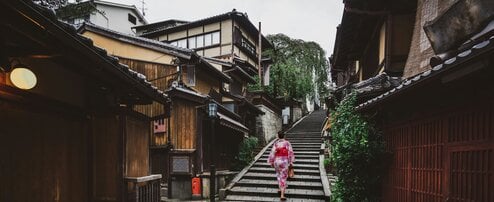
13 Things to Know Before Studying in Japan
Planning to study abroad in Japan? Here's everything you should know before you start your study abroad adventure!
Despite how much you love sushi, anime, and film-grain photos of old Japan, admiring a culture from afar is very different from living immersed in it. However, by studying in Japan, you’ll become familiar with the big picture: from the familiar cultural exports you enjoy to the social norms and traditions that may puzzle you at first.
Nothing beats cultural immersion, but that doesn’t mean that you should go into it unprepared. Here are 13 things to know before studying abroad in Japan!
1. English is less common than you think, so learn some basic Japanese!
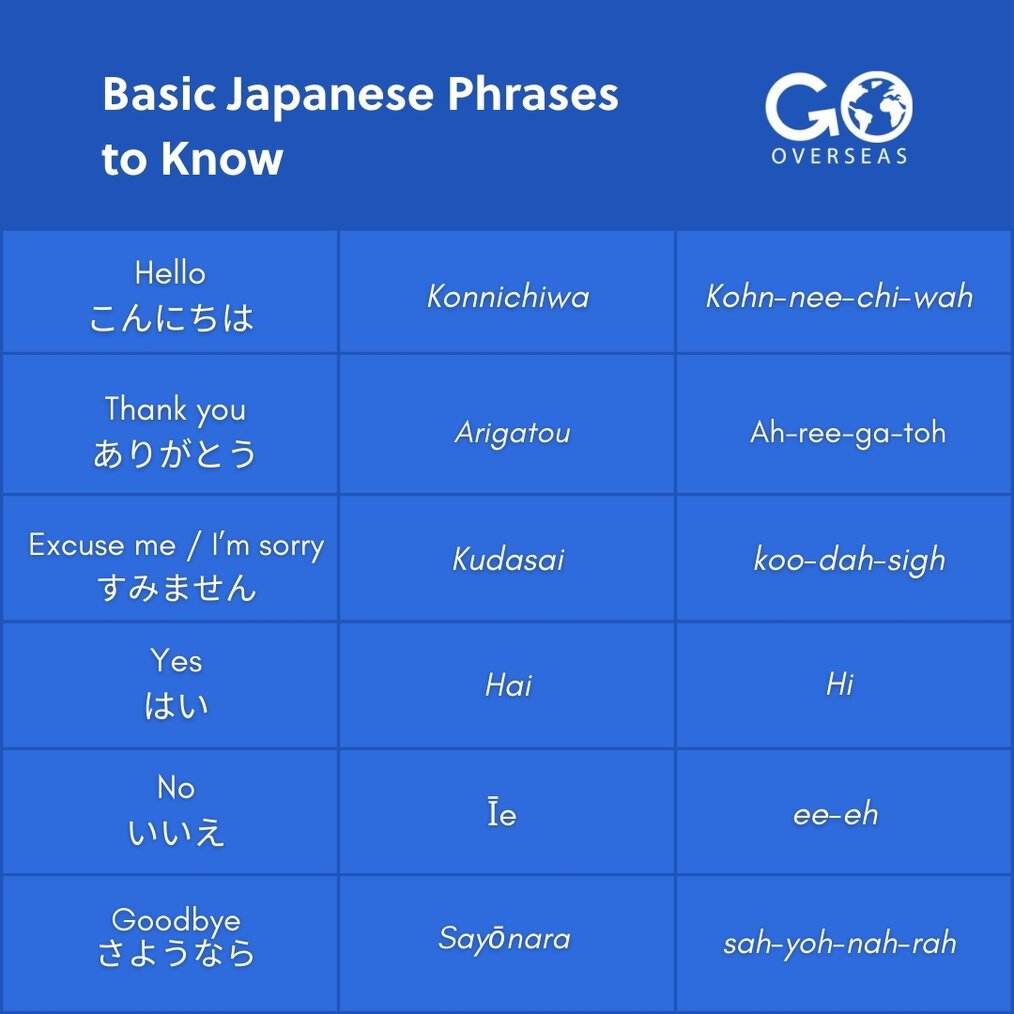
Most Japanese people have studied English at some point if they’ve gone through the standard school system, but that doesn’t mean they’re confident speaking it.
If you’re lost, late, or require serious help, don’t rely on the assumption that someone nearby can speak English fluently. While English is thought to be the business language of the world, it’s important to remember that it’s not the language used in everyday life!
After all, Japanese people shouldn’t have to compromise in their home country. So, it’s best to assume you’ll encounter language barriers.
Consider learning Japanese phrases to not only get by but also to turn fleeting encounters into meaningful interactions with the local population. People will usually appreciate that you are learning their native language, and will likely warm to you instantly.
You can take some formal lessons before you study in Japan, but some study abroad programs will also offer Japanese language courses alongside your other classes. You can also download useful apps such as Duolingo or Ling to make language learning an everyday habit.
Read more: How to Study Abroad in Japan in English
2. Japan’s public transportation system is efficient but complex
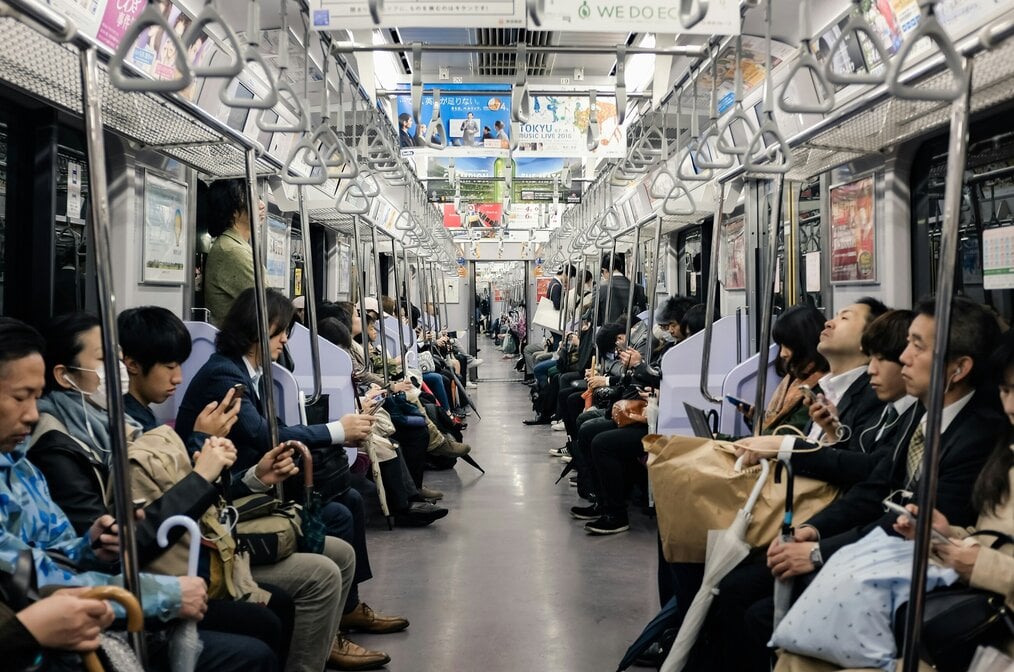
Japan is known not only for its efficient public transportation but also for its frantic rush hour and sardine-packed coaches. Considering that Tokyo is the most populated city on earth, this should come as no surprise!
As a student, you’re highly unlikely to be using anything other than public transportation, so it's best to familiarize yourself with it. Here are some of the most important tips when it comes to getting around in Japan:
- Get a transport pass: It’s possible to buy tickets on a standalone basis, but it’s worth getting an IC card to get around. These are cards that you can load money onto to get around via the metro, subways, and buses, and they’re available in big cities such as Tokyo, Osaka, Kyoto, and more. The Japan Rail (JR) Pass is an option for intercity travel, but it’s catered to short-term tourists and doesn’t cover the subway or buses.
- Avoid rush hour (if you can): In enormous cities such as Tokyo, rush hour can last from 7 am to 9 am, turning it into “rush hours”. If your schedule allows it, consider traveling before or after these times to get around!
- Ensure that you have a data plan: Before or soon upon arrival in Japan, make sure that you have access to internet data that won’t cost you a fortune. The metro system can feel like a labyrinth, its maps can be difficult to interpret, and English signs aren’t as prevalent as you might expect so it’s important to be able to access online resources to guide you.
- Download the right apps: Fortunately, Google Maps works in Japan. Otherwise, you can download other useful apps such as Japan Transit Planner, Tokyo Subway Metro Map, and Japan Travel to help you get around easily.
- Don’t be afraid of walking or cycling: Tokyo is relatively flat, so walking or cycling isn’t as crazy as it looks from the outside. If you’re placed in a more rural or quiet area of Japan, you may find cycling the most convenient option. Some students have even mastered the art of biking and texting, applying mascara, or playing game systems, but don’t run before you can walk!
- Many stations share the same name: Did you know that there are at least 5 variations of stations with the name “Shinjuku” in Tokyo? Before you set off, ensure that you have the right station in your navigation system!
- People are employed as “passenger pushers”: You read that right! People are employed to help fit people on carriages that are full to the brim. While ordinary in Japan, it can be either amusing or considered invasive from the perspective of a foreigner.
3. The grading system is different
Ensure that you understand how your course is being graded. Japanese universities or colleges typically follow a GPA system and grade students from A to F. If you’re really good, you may get an S grade! That’s right, S, or shū (秀), is higher than A! But, it’s rarely given.
It’s important to establish how your work will be assessed beforehand, because Japanese and international schools may differ in how they grade assignments. Some study abroad courses may use a pass/fail system, whereas others grade your work with a more traditional approach.
When studying in a Japanese high school, for example, teachers may take into account other factors of your performance, such as your thinking, judgment, expression, and attitude in the classroom.
4. Japan is very safe
Compared to most countries, Japan is a very safe place to live, and statistics show that it has some of the lowest crime rates in the world. People are generally respectful and take great pride in their cool temperament, “saving face”, and their honorable reputation.
Maintaining personal harmony is important when it comes to someone’s honor, and the concept of “saving face” is rooted in not losing your temper or compromising social integrity. Because of the strong emphasis on these values, you’ll rarely see confrontation in Japanese society.
However, petty crime exists everywhere, as does serious crime. Whether you’re at the local market, karaoke bar, nightclub, or elsewhere, be wary of your surroundings, and possessions, and don’t overdo it with shōchū or saké!
5. There will be notable cultural differences
Studying abroad presents many opportunities to learn about new and different cultural norms. This grants us insight into cultural nuances as well as new methods and practices, but it can also expose us to culture shock.
Culture shock is especially common when you encounter language barriers. Although Japan shares a lot of pop culture with Western countries, it’s still a very different place. Being somewhere more homogenous with a strong national identity - such as Japan - can intensify feelings of culture shock.
There will be times when you’re irritated by things for no good reason. Maybe it will be instances of ageism, the suffocating rush hour, or the relentlessness of rice-based dishes!
Here’s how you can minimize culture shock:
- Go with the flow! Culture shock stems from differences that may annoy, confuse, or trigger you. However, it doesn’t last forever, and the worst thing that you can do is reject cultural differences. Remember that this is a temporary measure in a powerful journey that will make you an independent and adaptable traveler.
- Be gentle with yourself: Culture shock is entirely normal! It’s also easy to feel guilty when you’re in an amazing country but feel unhappy. Remember to breathe deeply and embrace quality “me time” whether you go for a walk in the park or revisit your favorite comfort show from home.
- Contact loved ones: Speaking to your friends and family members is one of the best ways to vent and express your feelings. They can help not only validate your feelings but remind you that this is only a short phase in an amazing and life-changing experience.
- Journaling: From writing down your thoughts and noting the unique things you did and saw that day, to using a gratitude journal to express what you’re thankful for, journaling is a great way to reduce anxiety and overcome negative feelings induced by culture shock!
6. There are many festivals to experience
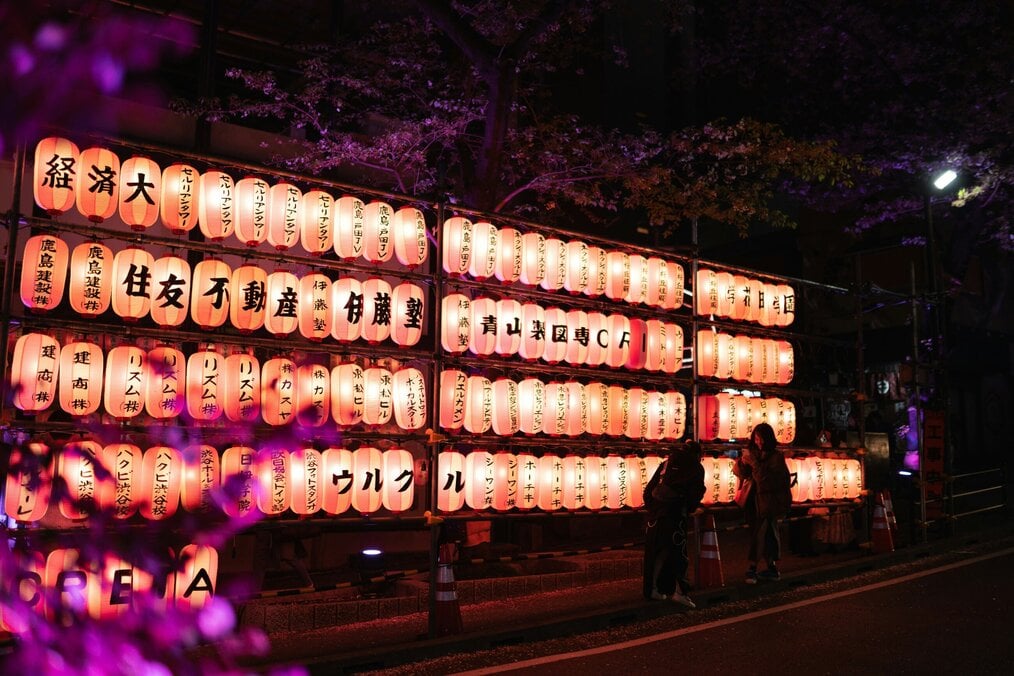
There are plenty of festivals for you to celebrate while studying in Japan, such as the New Year, the Emperor’s birthday, Golden Week, and many more.
Golden Week is one of the biggest holidays in Japan, and it takes place at the end of April and the beginning of May. Much of the country goes into a vacation frenzy during a hefty week of multiple public holidays. Families get together, people go traveling, and queues wind around every attraction.
If you’re studying in Japan during the springtime, it’s best to plan golden week accordingly! Hotel prices typically increase, so it’s not a bad idea to stay local and go sightseeing in surrounding areas. Ask your study abroad advisor or see what your local Japanese friends are up to during this holiday for inspiration!
7. It's possible to study abroad in Japan on a budget
People often list Japan as an expensive destination. However, it’s often overstated how expensive it really is, and it’s entirely possible to study abroad in Japan on a budget. This is especially the case when comparing the weakening of the yen against the US dollar.
When you’re new to the country, you’ll be drawn into seeing iconic attractions and visiting karaoke bars and nightclubs. But, as an established international student living in Japan, you’ll have a fantastic opportunity to gain insight into less touristy (and less expensive) diversions.
Befriending members of the local community can help you not only practice Japanese but also grant you access to some of the best spots across town. Additionally, from student-led activities, local hikes, food-making classes, festivals, and more, there are plenty of things you can do for free or cheap!
If you’re still concerned with the financial side of things, you can always apply for study abroad scholarships and grants. These financial aids can be a great deal of support for international students, and thousands of dollars go unclaimed each year because people are unaware that they exist.
8. Summers can be sweltering and winters, freezing
Japan can be both sweltering and freezing depending on the time of year that you’re visiting, so be sure to pack accordingly!
When you consider the packed subways, its conservative clothing culture, and rushing around, summers in Japan can feel oppressive. Consider purchasing lightweight clothing to get through the summer. On the other hand, Japan is no stranger to cold, snowy winters, so don’t forget about thermals and thick coats!
Temperatures in Tokyo, Osaka, and Kyoto can range from 35°F to 53°F (4°C to 12°C) in the winter, and from 77°F to 86°F (25°C to 30°C) in the summer. While those summer highs may not sound too bad, humidity levels can reach 80% or more. This means that if you’re studying in Japan long-term, your suitcase will need to be diverse!
If you’re worried about winter clothes taking up precious space in your suitcase, keep in mind that you’re never far away from a Uniqlo in Japan!
9. You’ll probably make lots of friends
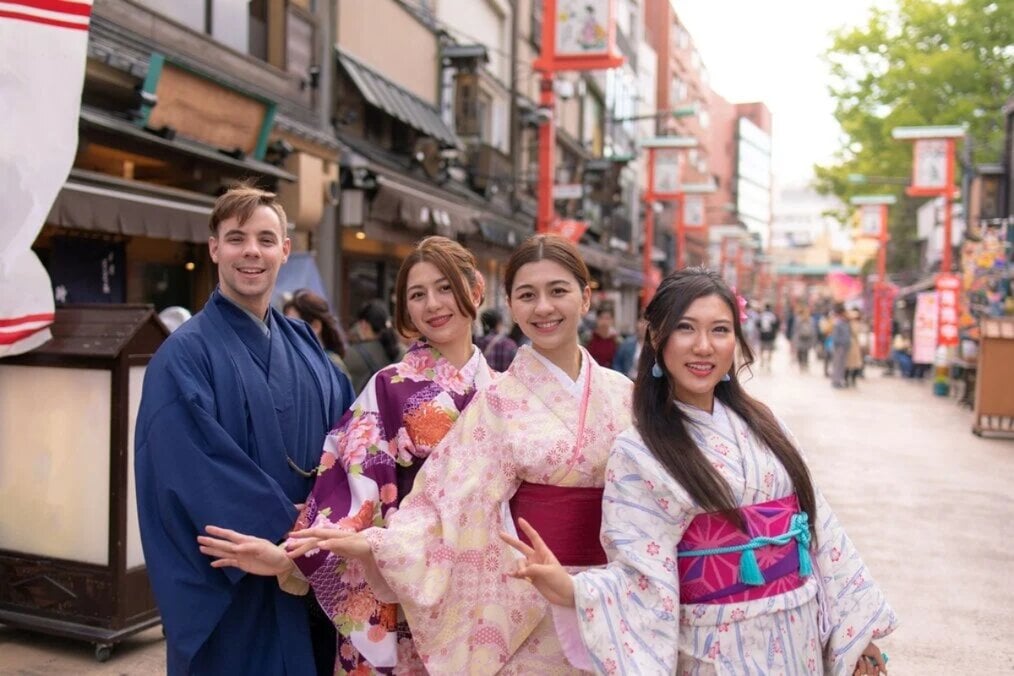
One of the biggest things people are concerned about when studying abroad is how they’ll make friends. The great thing about studying in Japan is that you can integrate yourself within both the international and local community!
Japan welcomes around 250,000 international students each year, creating a strong international and expat community, particularly in areas such as Tokyo, Kyoto, and Osaka. Taking part in student-led university activities, joining sports teams, social clubs, and scrolling through social media pages is a great way to meet other international students.
Befriending locals can be challenging at first when you’re still finding your feet in a new country and are faced with language barriers, and Japanese people are often described as shy and reserved. But with a little perseverance, you can form new friendships that will greatly enrich your experience abroad. Consider joining social activities, language exchanges, festivals, and events outside of your university!
10. You can study in Japan without knowing Japanese
While learning Japanese will certainly benefit and enrich your experience, you can still study abroad in Japan without knowing the language. There are a range of popular universities that offer programs entirely in English.
If you aren’t confident in your Japanese skills - especially within the academic environment - you can still study Japanese outside of your university classes. This can be a huge weight off your shoulders if you’re looking to improve your Japanese but don’t want to compromise your grades.
Here are some of the most popular programs in Japan that offer classes taught entirely in English:
11. Politeness goes a long way in Japan
We’re assuming that you’ve heard about how polite people are in Japan. From bowing to others to taking your shoes before entering someone else’s home, politeness and showing respect go a long way in Japan. “Bushido” refers to a Japanese moral code that exemplifies “the way of the warrior” and also the virtue of respect and sincerity.
Bowing is a common form of greeting in Japanese culture, particularly if you’re meeting teachers, professors, or other people of authority. The more respect that someone commands, the lower you’ll bow your head. While Japanese people may not expect a foreigner to bow, it will show a great level of politeness and cultural awareness!
There is also a great emphasis on elder authority in Japanese communities, and Respect for the Aged Day is its own public holiday. Elderly people are respected in Japan due to their wisdom and life experiences, and people show this by adding san after their name. As a foreigner, consider giving up your seat on the train or the bus, or bowing lower to show them a greater level of respect.
12. People dress conservatively
People in Japan maintain a rather conservative dress code and can take pride in their appearance, so be mindful of what you’re wearing in public. Many people wear clothes that cover their shoulders and knees and sometimes conceal tattoos because they traditionally carry negative connotations.
Be sure to wear clothing that isn’t too revealing and cover tattoos when you can. Sometimes, Japanese people maintain this rule even in the gym! Very rarely will you see people walking down the street wearing gym clothes, so don’t expect to saunter into the classroom wearing your Nike shorts and a tank top.
Keep in mind that sites such as temples, shrines, and other religious or cultural structures are not merely tourist attractions. While Japanese people will understand that you’re a foreigner and unfamiliar with their customs, it’s best to demonstrate politeness and dress appropriately to respect their culture.
13. There is distinct dining etiquette
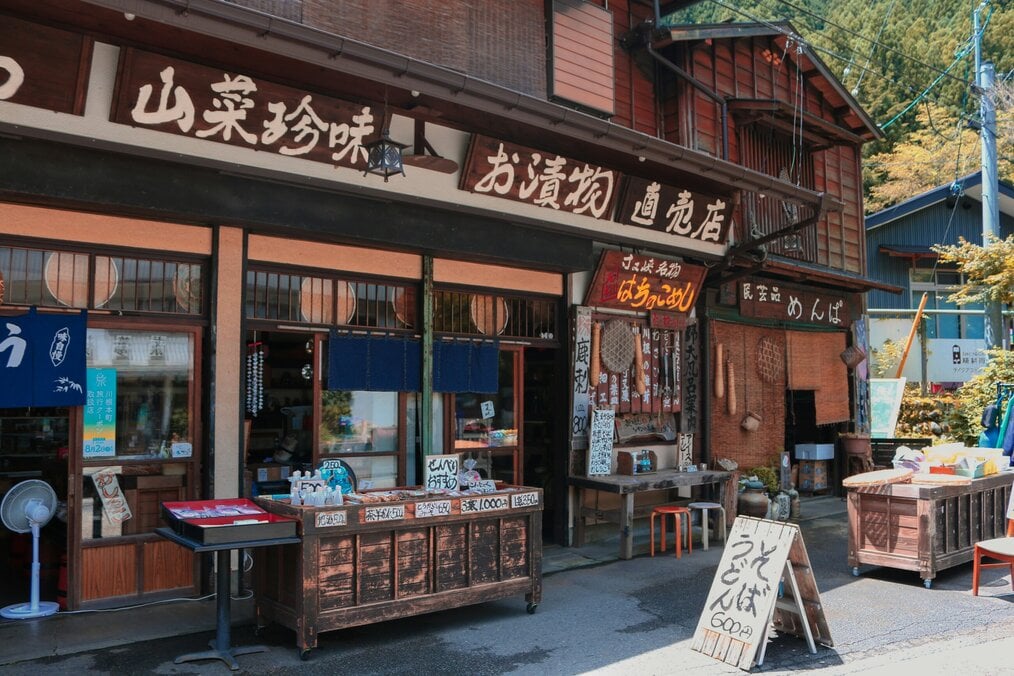
In Japan, you’ll need to adjust to a few things to fit in seamlessly with its dining etiquette.
Firstly, when eating on the low tables and tatami - the type of mats used as flooring in more traditional Japanese buildings - remove your footwear beforehand. People often say “itadakimasu” (I humbly receive this meal) when receiving your meal, and “gochisōsama deshita” (thank you for the feast) upon finishing. A service charge is often included in the bill, so tipping isn’t expected in Japan.
Use dedicated chopsticks for moving food when you’re sharing dishes, and slurping your soup is also encouraged because this displays your appreciation! Never stick your chopsticks into your bowl of rice when not in use as this is considered rude due to its association with funerals.
When drinking, don’t start until everyone at the table has a drink and has raised their glass together while saying “kanpai” (乾杯) or cheers! If you want to fill up your glass, ask your friends whether they also want to be topped up, and keep your elbows off the table as it’s considered bad manners.
How to study abroad in Japan
Now that you've gained a wealth of cultural tips, you’re probably wondering what steps you need to take to study abroad in Japan!
- Compare your options: You can study abroad through direct enrollment, which is cheaper but offers much less support throughout the process. If you choose this route, you will need to handle the application, registration, and housing on your own. Alternatively, you can study through a third-party program that will help you with your program onboarding, visa process, accommodation, in-country orientation, and much more. However, third-party programs typically cost more than direct enrollment.
- Choose a study abroad program & location: You’ll need to choose a program that’s engaging and will benefit your goals to maximize your study abroad experience. Additionally, consider what sort of lifestyle you want. Do you want to live in the thriving streets of Tokyo, the quaint stress of Kyoto, or somewhere smaller such as Kamakura or Takayama?
- Gather your documents: Give yourself plenty of time to apply to programs to avoid any last-minute obstacles down the line. Prepare any academic transcripts, letters of recommendation, and other useful documents for your application well ahead of the deadline.
- Submit your study abroad application: Once you’ve gathered your documents and found the perfect study abroad program in Japan, submit your application!
- Apply for your visa and book your flights: Congratulations, you’re going to the Land of the Rising Sun! Now, you’ll need to obtain your student visa and book your flights!
Frequently asked questions about studying abroad in Japan
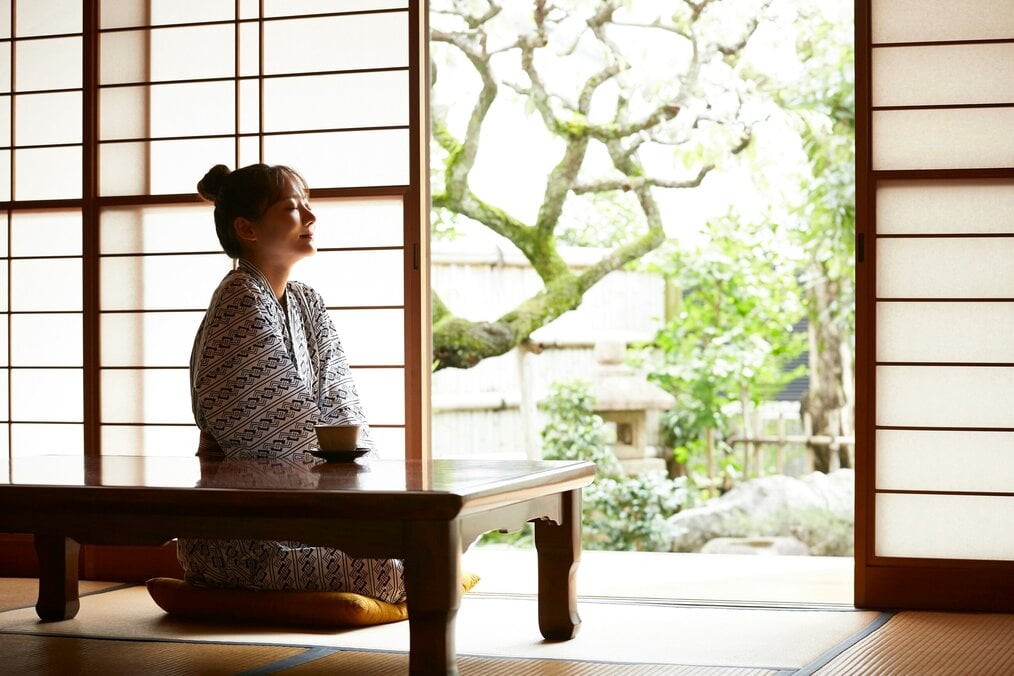
As such a popular study abroad destination for international students, there are bound to be many questions. Here are the most frequently asked questions about studying abroad in Japan.
Is Japan a good place to study abroad?
Japan is a fantastic place to study abroad. Studying in Japan allows international students to gain an education at reputable universities and a cultural perspective in a country that has a strong national identity. Alongside meeting new people and seeing the world, studying in Japan grants you insight into one of the most innovative and developed Asian countries.
How much does it cost to study abroad in Japan?
To study abroad in Japan through direct enrollment, tuition fees can vary from $2,000 to almost $20,000 per semester, whereas studying with a third-party provider will vary from $8,000 to $25,000 per semester. You’ll also need to take into account airfare & visa costs, cost of living, cultural excursions, and more.
Can a UK/US student study in Japan?
Yes! Thousands of students from Western countries study abroad in Japan each year. Passport holders from the UK and US who want to study in Japan for longer than 90 days are required to obtain a student visa.
Can I study in Japan without knowing Japanese?
Yes, you can absolutely study in Japan without knowing Japanese. In fact, many study abroad in Japan in English. Although learning Japanese will optimize your cultural experience, many top universities in Japan offer programs exclusively in English.
Study abroad in Japan like a pro
Studying abroad in Japan is an amazing opportunity that can expose you to new opportunities in your academic and professional career. In addition to developing your subject-specific knowledge and skills, you’ll establish friendships for life, gaze upon iconic landmarks, and learn to diversify your perspective by immersing yourself in an Asian culture that prides itself on respect, honor, and social harmony.
Read more about studying in Japan:






